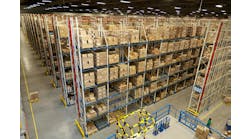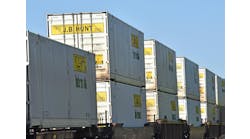While competitive and even survival goals are cited as motivators in moving to offshore sources, problems are occurring that can sink efforts in unanticipated legal and financial quagmires. The poll, conducted by Harris Interactive (www.harrisinteractive.com), indicates that while 66% of executives are trying to manage their supply chains in-house, 33% are suffering from "unclear lines of authority" for supply chain management.
Some have outsourced all of their offshore activities to third-party suppliers with varying degrees of success. Others have sought to avoid missteps while smoothing longer length supply-chain activities by maintaining control through technological solutions.
Strict adherence to governmental rules, meeting appropriate quotas and having all legal matters met is one way Liz Claiborne Inc. (www. lizclaiborneinc.com), a $4 billion fashion apparel maker, ensures smooth product movement throughout its global supply chain. Making use of available technological tools is a key for Lois Davis, vice president global logistics, in gaining visibility and control of the company's moves of more than 250 million units of product sourced in more than 35 countries. Davis is responsible for moving the goods once they come out of a factory through their arrival at final destination, whether a distribution-center (DC) or a customer. Although there are a number of solutions available, Davis finds that all they aren't necessary since Claiborne has internal applications to fill needs. Its core purchase order system, for example, works well. However, to monitor actual movement of goods once they leave the factory, Claiborne uses TradeBeam Inc.'s (www.tradebeam.com) global trade management solution.
"Depending on final customer requirements and parameters put into the application," explains Davis, "determination is made as to the best mode. With Trade-Beam we get the monitoring of the product. We can see whether the movement is by air, ocean, truck or a combination, and we're able to see movement from any origination to final destination."
Claiborne also monitors specific events that must take place for importation. "In the U.S. we have to make an entry to Customs and be released and can't finalize delivery until the shipment is released from Customs," Davis says.
"There are specific events like these that we also monitor, even if they're not a physical move. If there are exceptions, they are easy to see and manage."
In terms of monitoring events, Trade-Beam provides most of the information about the movement of goods from the factory: shipment departure, estimated arrival dates, notification of arrival, arrival at Customs, Customs clearance, release for pick up, and scheduled for final delivery, among other data.
Claiborne is in the process of enhancing its operations by availing itself of other TradeBeam functionality, such as a Product Catalog feature, which will allow the apparel company to maintain line reviews on all of its products, Davis notes. For that, TradeBeam will carry all classifications, categories, fiber content, and all requirements for the Harmonized Tariff Schedule. Product Catalog will interface with Claiborne's enterprise resource planning (ERP) system.
Since the ultimate responsibility for compliance rests with the importer, Claiborne finds it easer to handle Customs compliance internally rather than having to create an additional monitoring program. Once Product Catalog is in place Davis expects to incorporate its data into the way it currently handles compliance, simplifying many present processes.
The ability to manage by exception has proven invaluable at Liz Claiborne. "Not having to look at every single shipment and being able to focus on those that need to have something happen automatically provides efficiency," Davis says.


